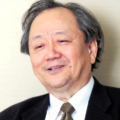The Responsibility of Developing “Global Human Resources”

MURATA Koji, President, Doshisha University
In 1968, the one hundredth anniversary of the Meiji Restoration, Japan rose to become the world’s second economic superpower after the United States. However, in 2011, the one hundredth anniversary of the Chinese Revolution, it was confirmed that China had overtaken Japan to become the world’s second economic superpower. It is believed that by 2030, Japan’s economy will drop to fifth place in the world rankings. China, on the other hand, while beset by a variety of domestic problems such as wealth disparity, environmental destruction, and the depletion of natural resources, is set to overtake the United States in 2025 to become the world’s number one economic superpower. China also has the potential to surpass the United States when it comes to national defense spending. The fact that Japanese industry and the Abe Cabinet are committed to fostering “global talent” out of a strong awareness of the need to raise Japan’s international competitiveness is understandable.
The responsibility of developing “global human resources” lies with Japanese universities.
*** *** ***
Japanese universities currently face two serious challenges and rivalries. One is the rapidly falling birthrate. Today, the population aged 18 which numbered more than 2.5 million in 1966 has dipped below 1.2 million, and this is expected to decline even more rapidly from 2020 onward. Over 780 Japanese universities, especially the 600 private universities, are engaged in a fierce battle for survival over admissions candidates, whose numbers are continuing to decline.
The other challenge is global rankings and performance evaluation. In the light of various world rankings, Japanese universities must now compete with overseas universities. The U.K.’s Times Higher Education World University Rankings is widely viewed as the most reputable of these world rankings. Accordingly, the government is devising policies in respect of the selection and patronage of internationally competitive “Super Global Universities” that will take their place among the world’s top universities according to this world ranking (specifically, the top 100).
Within this context, it was no surprise that the February 2014 issue of the monthly magazine Chuokoron included the Special Issue: The University Outcry – Merits and Demerits of Rankings and Performance Evaluation.” Up to now, Japanese universities had not been complacent. It is no exaggeration to say that there has been no time over the past twenty years that university reform has not been talked about. Reforms may have been slow from the standpoint of society (in particular industry), but (or rather, for this reason) Japanese universities are now intensely weary of reforms, and have the prospect of even more competition as a result of the falling birthrate and globalization hanging over them. It is no wonder that universities are “outcrying.”
*** *** ***
Accordingly, I would like to point out two points of uncertainty where this type of competitive ranking is concerned from the point of view of universities.
Firstly, all rankings reflect the biases of those who compile them, with a tendency for the criteria used to be based only on aspects that can be easily expressed in numerical form. Moreover, a considerable number of aspects are concealed by the rankings. These aspects are being debated by two eminent economists.
An additional example is the issue of educational expenses at American universities. In the case of prestigious private universities such as Harvard, undergraduate tuition fees and dormitory fees would be close to 5 million yen per year. This amounts to 20 million yen for four years, which stands comparison with education expenses for private medical school in Japan (26 million yen for six years). In the United States, 38 million university students take out loans for educational expenses, totaling US$ 1.2 trillion. The burden of heavy educational expenses weighs heavily on the lives of America’s middle class, with specific fields of industry such as finance being saturated by graduates of renowned universities seeking to repay the debt, leading to the uneven distribution of talent. If ranking alone becomes the issue, this kind of socioeconomic context becomes obscured.
Next is the sense of distrust toward politics and government. This too is wide-ranging. In terms of previous university reforms led by politics and government, there is a deeply rooted distrust on the part of the universities in respect of reforms that did not yield the results that were initially envisaged (for example, the national bar examination reform), and a feeling of being victimized because ultimately the burden more often than not has been imposed on the university itself.
Further, on the one hand an attempt is being made to abolish the National Center Test for applicants seeking admission to national and public universities and replace it with selection according to a single academic achievement score, while on the other hand university world rankings are a major focus of attention. Both sides include a considerable number of university stakeholders who are skeptical of the underlying educational concept or philosophy.
Also, is it really appropriate to debate and attempt to tackle at the same time the two issues of advancing the globalization of universities and improving world rankings? Surely the desire of politics and industry to seek important changes to the powers of university presidents and faculty senates also runs counter to the trend toward deregulation?
Moreover, is the politics and government that is pushing strongly for the globalization of universities itself globalized (or endeavoring to become so)? In my opinion, of the various industry segments in Japan, politics is one of the slowest to globalize, and I do not believe that this guarantees fair competition. This is surely clear too when we look at the issue of relative vote weight disparity or hereditary politicians.
Also, even if the term “global talent” is used by industries that pursue efficiency and profit, there is a tendency for administration and universities to hesitate to talk about this as if it were the absolute priority for education.
*** *** ***
Nevertheless, we cannot just sit still and watch the inertia and neglect on the part of universities. Ranking can also be a motivating factor that serves as an incentive to universities. In the context of the tough international environment mentioned at the beginning of this article, Japanese universities cannot be satisfied with the preservation of the status quo.
Whether university rankings or a review of the powers of university presidents and faculty senates, this is nothing more than one of a variety of measures, and is not in itself the goal of university education. Also, every measure has positive and negative aspects. They must be introduced with caution, and must be applied wisely. Further, efforts need to be stepped up for politics, government, and industry on the one hand and universities on the other hand to sweep away mutual distrust and misunderstandings. Moreover, all stakeholders are called upon to exercise intellectual integrity and breadth of vision that does not reduce the problems facing Japanese society as a whole to the problems of universities.
Translated from an original article in Japanese written for Discuss Japan. [March 2014]




